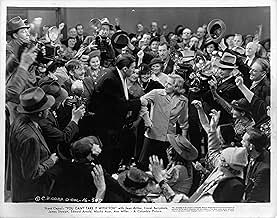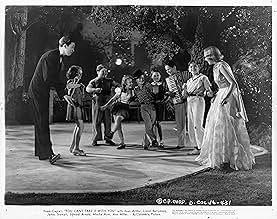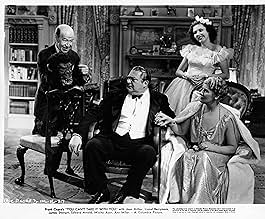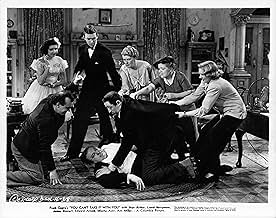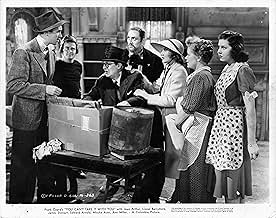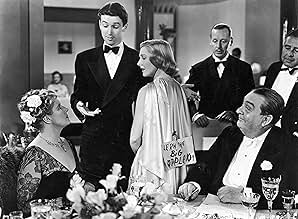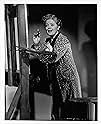ÉVALUATION IMDb
7,8/10
30 k
MA NOTE
Un homme issu d'une famille riche et snob se fiance à une femme issue d'une famille gentille, mais franchement excentrique.Un homme issu d'une famille riche et snob se fiance à une femme issue d'une famille gentille, mais franchement excentrique.Un homme issu d'une famille riche et snob se fiance à une femme issue d'une famille gentille, mais franchement excentrique.
- Director
- Writers
- Stars
- A remporté 2 oscars
- 6 victoires et 7 nominations au total
Eddie 'Rochester' Anderson
- Donald
- (as Eddie Anderson)
Avis en vedette
You Can't Take it With You is a very funny and entertaining film. Bringing Up Baby is probably the only film that has ever made me laugh as hard as this one. James Stewart and Jean Arthur are magical together, just as they were in Mr. Smith Goes to Washington. This is yet another great film by Frank Capra and was rewarded with an Oscar for Best Picture in 1938.
Stewart comes from a rich and completely uptight family. Miss Arthur is the only relatively sane member of a very wild family. Lionel Barrymore is wonderful as the grandfather here. He is so warm and funny in this movie, it's hard to believe he's the same man who played the evil Mr. Potter in It's A Wonderful Life. Edward Arnold who was known for playing slimy villians, is great as Stewart's very wealthy and totally stuck-up father.
Stewart comes from a rich and completely uptight family. Miss Arthur is the only relatively sane member of a very wild family. Lionel Barrymore is wonderful as the grandfather here. He is so warm and funny in this movie, it's hard to believe he's the same man who played the evil Mr. Potter in It's A Wonderful Life. Edward Arnold who was known for playing slimy villians, is great as Stewart's very wealthy and totally stuck-up father.
One message. "Nothing is worth doing if you can't enjoy it, and when it's over- you can't take it with you!"
Do any of Capra's works actually speak 'that' one particular message? Perhaps the closest to the above is "It Happened One Night". "Lost Horizon" is about rediscovery and peace of mind. "Mr Smith" is politically and small town oriented and "Mr Deeds" deals with the same except without some political yawn. George Bailey should have had a better dosage of the "You Can't Take it With You" policy in "It's a Wonderful Life".
Here is a play that exercises Frank Capra's famous adage with all humour already built in. Why shouldn't it work?
The stage version was a phenomenal success, written superbly by George S. Kaufman and Moss Hart. If their story is slightly lacking, look no further than the delightful cast of characters. Mr Poppins, toy and mask maker. Alice's Father who meddles with fireworks. Essie the ballerina, Penny the playwright and the wonderful Russian ballet teacher. The uptight Kirby banking corporation. Then there's the "Mr Smith" duo, Tony (Jimmy Stewart) and Alice (Jean Arthur).
The stand out performer here, is naturally the lovable Lionel Barrymore as Grandpa Vanderfhoff. Although the first film in which the damaging effects of his arthritis began to show, Capra had his leg put in a cast and had him move around on crutches. He relishes his performance.
I have heard of complaints which discuss the fact this film fails to address corruption and greed in a similar manner to "Mr. Smith Goes to Washington" which successfully played its part going against the American capital. Once again, Capra emphasises his favourite theme of the little guy up against the world and succeeds, but "You Can't Take it With You" basically does not even make a mild attempt to criticise the American system of government, past or present, even though I know very little about it.
On different levels, look at this film in the light of discussing heavier issues, as the aforementioned greed and corruption. I just don't think Mr Capra would have liked it as much for one of his works to be remembered like that, especially with the basic message staring at us right in the face.
Nevertheless, it is another of Capra's life saving feel good movies. All it is encouraging us to do is to have a little fun.
Rating: 8/10
Do any of Capra's works actually speak 'that' one particular message? Perhaps the closest to the above is "It Happened One Night". "Lost Horizon" is about rediscovery and peace of mind. "Mr Smith" is politically and small town oriented and "Mr Deeds" deals with the same except without some political yawn. George Bailey should have had a better dosage of the "You Can't Take it With You" policy in "It's a Wonderful Life".
Here is a play that exercises Frank Capra's famous adage with all humour already built in. Why shouldn't it work?
The stage version was a phenomenal success, written superbly by George S. Kaufman and Moss Hart. If their story is slightly lacking, look no further than the delightful cast of characters. Mr Poppins, toy and mask maker. Alice's Father who meddles with fireworks. Essie the ballerina, Penny the playwright and the wonderful Russian ballet teacher. The uptight Kirby banking corporation. Then there's the "Mr Smith" duo, Tony (Jimmy Stewart) and Alice (Jean Arthur).
The stand out performer here, is naturally the lovable Lionel Barrymore as Grandpa Vanderfhoff. Although the first film in which the damaging effects of his arthritis began to show, Capra had his leg put in a cast and had him move around on crutches. He relishes his performance.
I have heard of complaints which discuss the fact this film fails to address corruption and greed in a similar manner to "Mr. Smith Goes to Washington" which successfully played its part going against the American capital. Once again, Capra emphasises his favourite theme of the little guy up against the world and succeeds, but "You Can't Take it With You" basically does not even make a mild attempt to criticise the American system of government, past or present, even though I know very little about it.
On different levels, look at this film in the light of discussing heavier issues, as the aforementioned greed and corruption. I just don't think Mr Capra would have liked it as much for one of his works to be remembered like that, especially with the basic message staring at us right in the face.
Nevertheless, it is another of Capra's life saving feel good movies. All it is encouraging us to do is to have a little fun.
Rating: 8/10
Among all the enthusiastic reviews for this movie, it is hard to find a sufficiency of praise for the work of Edward Arnold. A familiar face on the screen in the thirties and forties, with his round face, solid body, and trademark pince-nez, Arnold surpasses himself in this film
Too often type-cast as a plutocrat, Arnold nevertheless demonstrates nuance and sensitivity as a man who, despite many flaws and faults, is redeemed by his love for his son. Arnold is seldom credited with the subtlety and poignancy of his characterizations, probably because he generally played greedy capitalists in a time when greedy capitalists were even more frightening than they are (and properly so) now, but this is an omission that should be corrected. His characterization in this comedy is a powerful performance, and grossly under-appreciated. He was one of the masters of American cinematic acting, with never a false note on his performances, and it is shameful that he is not so acknowledged.
Too often type-cast as a plutocrat, Arnold nevertheless demonstrates nuance and sensitivity as a man who, despite many flaws and faults, is redeemed by his love for his son. Arnold is seldom credited with the subtlety and poignancy of his characterizations, probably because he generally played greedy capitalists in a time when greedy capitalists were even more frightening than they are (and properly so) now, but this is an omission that should be corrected. His characterization in this comedy is a powerful performance, and grossly under-appreciated. He was one of the masters of American cinematic acting, with never a false note on his performances, and it is shameful that he is not so acknowledged.
10gaityr
I wouldn't exactly call YOU CAN'T TAKE IT WITH YOU (YCTIWY) Capra's forgotten movie--after all, it *did* win the Best Picture Oscar in its year. And I *have* heard of this film by word of mouth previously, though perhaps not as frequently or with as much ubiquity as some of Capra's other films. Compared to IT'S A WONDERFUL LIFE and MR. SMITH GOES TO WASHINGTON, for example, YCTIWY distinctly has the status of a 'minor classic'. I don't believe this is deserved, even if themes and (co-)stars are shared between these movies: YCTIWY should definitely be far better known and remembered than it actually is.
First of all, the story-telling is flawless. It very cleverly sets up the two very different families, the Vanderhof/Sycamores (an offbeat family trading most importantly in happiness) and the Kirbys (a stiff up tight banking family trading mostly in weapons). To complete the biggest deal of his career, Anthony Kirby Sr (Edward Arnold) must buy up the last house in a neighbourhood, and of course, this house belongs to Martin Vanderhof (a delightful Lionel Barrymore). The movie pleasantly surprised me in *not* having young Tony Kirby (James Stewart) be assigned to get Vanderhof to sell his house and thereby falling in love with Alice Sycamore (Jean Arthur) and her zany family. Rather, he was in love with her to begin with, and loved her regardless of what he thought of her family. (Though it would be impossible to hate any of them, I feel!) The story really is simple: Tony loves Alice no matter what, and doesn't want her or her family to put on a show to impress his own family. When he surprises her by turning up a day early for a dinner engagement, the Kirbys meet the Vanderhof/Sycamores for who they truly are, wind up in jail, and along the way, learn a little bit about being real human beings.
There are several delightful scenes in the film as well, all beautifully filmed and connected such that the story is a coherent whole. I'm especially partial to practically any scene with James Stewart wooing Jean Arthur (those two, quite seriously, make the cutest couple imaginable)--I love it when he sort of proposes to her. "Scratch hard enough and you'll find a proposal." Or that lovely intimate scene in the park where he directs her to a seat like he would at the ballet, or when they start dancing with the neighbourhood children. The scene in the restaurant was also amusing, when Tony kept warning Alice that there was a scream on the way, building it up so perfectly that *she* wound up screaming before he did. It's hard to beat the scene in night court too, when Capra foreshadows pretty much the exact same scene and sentiment in the forthcoming IT'S A WONDERFUL LIFE, when all of Vanderhof's friends chip in to pay off his fine. It's sweet, it's real, and it's something you really do wish could still happen in this world. Even the littlest things like Grandpa Vanderhof's dinnertime prayers are enough to remind the viewer of what a world could be like if we kept our values simple, our wants satisfied, and ourselves happy.
Second of all, the acting is superlative. How could it *not* be, with a cast like this? Evidently I was completely charmed by James Stewart and Jean Arthur, who are both incredibly believable both as real people and movie stars, and who together make Tony and Alice an utterly credible, true-to-life couple. Edward Arnold was great as the stuffed shirt Anthony Kirby Sr too--his eventual 'thawing' was something that could easily have been played in too exaggerated a fashion, but both the actor and director, I suspect, are too good to have allowed that to happen. I also had great fun watching Ann Miller in her secondary role as Essie Sycamore, Alice's dancing sister. I sincerely hope that every person making this film had just as much fun as I did watching it, because the whole secondary cast was excellent, and I loved all the characters we were introduced to, particularly the entire Sycamore family with their attendant friends (the ex-iceman DePinna, or the toymaker Poppins) and even their servants Rheba and Donald, who were treated almost as much as part of the family as could be expected at that time. But my greatest praise would have to be reserved for Lionel Barrymore as Martin Vanderhof--a sweeter, lovelier old man you just couldn't imagine, and a complete change from his much-better-known Mr. Potter in IT'S A WONDERFUL LIFE. He really does make Grandpa Vanderhof very much a real person, from his reminiscences about Grandma Vanderhof, to his messing around with the IRS agent, to his harmonica-playing and evident love of life and people.
I really could not say enough good things about this movie (which I prefer to IT'S A WONDERFUL LIFE). It'll make you laugh, it'll make you cry, and quite frankly, it'll make you glad to be alive. Not many movies can do that. And it's most certainly true that you can't take your money with you... but what you *can* do is take this movie and its message to heart. 10/10, without a doubt.
First of all, the story-telling is flawless. It very cleverly sets up the two very different families, the Vanderhof/Sycamores (an offbeat family trading most importantly in happiness) and the Kirbys (a stiff up tight banking family trading mostly in weapons). To complete the biggest deal of his career, Anthony Kirby Sr (Edward Arnold) must buy up the last house in a neighbourhood, and of course, this house belongs to Martin Vanderhof (a delightful Lionel Barrymore). The movie pleasantly surprised me in *not* having young Tony Kirby (James Stewart) be assigned to get Vanderhof to sell his house and thereby falling in love with Alice Sycamore (Jean Arthur) and her zany family. Rather, he was in love with her to begin with, and loved her regardless of what he thought of her family. (Though it would be impossible to hate any of them, I feel!) The story really is simple: Tony loves Alice no matter what, and doesn't want her or her family to put on a show to impress his own family. When he surprises her by turning up a day early for a dinner engagement, the Kirbys meet the Vanderhof/Sycamores for who they truly are, wind up in jail, and along the way, learn a little bit about being real human beings.
There are several delightful scenes in the film as well, all beautifully filmed and connected such that the story is a coherent whole. I'm especially partial to practically any scene with James Stewart wooing Jean Arthur (those two, quite seriously, make the cutest couple imaginable)--I love it when he sort of proposes to her. "Scratch hard enough and you'll find a proposal." Or that lovely intimate scene in the park where he directs her to a seat like he would at the ballet, or when they start dancing with the neighbourhood children. The scene in the restaurant was also amusing, when Tony kept warning Alice that there was a scream on the way, building it up so perfectly that *she* wound up screaming before he did. It's hard to beat the scene in night court too, when Capra foreshadows pretty much the exact same scene and sentiment in the forthcoming IT'S A WONDERFUL LIFE, when all of Vanderhof's friends chip in to pay off his fine. It's sweet, it's real, and it's something you really do wish could still happen in this world. Even the littlest things like Grandpa Vanderhof's dinnertime prayers are enough to remind the viewer of what a world could be like if we kept our values simple, our wants satisfied, and ourselves happy.
Second of all, the acting is superlative. How could it *not* be, with a cast like this? Evidently I was completely charmed by James Stewart and Jean Arthur, who are both incredibly believable both as real people and movie stars, and who together make Tony and Alice an utterly credible, true-to-life couple. Edward Arnold was great as the stuffed shirt Anthony Kirby Sr too--his eventual 'thawing' was something that could easily have been played in too exaggerated a fashion, but both the actor and director, I suspect, are too good to have allowed that to happen. I also had great fun watching Ann Miller in her secondary role as Essie Sycamore, Alice's dancing sister. I sincerely hope that every person making this film had just as much fun as I did watching it, because the whole secondary cast was excellent, and I loved all the characters we were introduced to, particularly the entire Sycamore family with their attendant friends (the ex-iceman DePinna, or the toymaker Poppins) and even their servants Rheba and Donald, who were treated almost as much as part of the family as could be expected at that time. But my greatest praise would have to be reserved for Lionel Barrymore as Martin Vanderhof--a sweeter, lovelier old man you just couldn't imagine, and a complete change from his much-better-known Mr. Potter in IT'S A WONDERFUL LIFE. He really does make Grandpa Vanderhof very much a real person, from his reminiscences about Grandma Vanderhof, to his messing around with the IRS agent, to his harmonica-playing and evident love of life and people.
I really could not say enough good things about this movie (which I prefer to IT'S A WONDERFUL LIFE). It'll make you laugh, it'll make you cry, and quite frankly, it'll make you glad to be alive. Not many movies can do that. And it's most certainly true that you can't take your money with you... but what you *can* do is take this movie and its message to heart. 10/10, without a doubt.
Take a large free-spirited family without visible means of support. Add a large mean-spirited tycoon intent on taking over their neighborhood. Mix in a romance between their daughter & his son. Sprinkle with zaniness & bake for two hours. Enjoy while hot.
This is one of those big comedy productions with a huge cast that only someone like Frank Capra could have pulled off. That he did so, winning the 1938 Best Picture Oscar, is immensely to his credit.
Hobbling on the crutches that signaled the crippling arthritis that would soon confine him to a wheelchair, Lionel Barrymore is the focal point of the film as the grandfather of a wacky clan that believes in doing whatever makes them happy. So they dance, make fireworks, bake candy, paint, write novels, and construct toys with equal joy - laughing through the Depression with much love & great contentment. Jean Arthur, James Stewart & Edward Arnold co-star, with a mammoth cast of supporting players.
This is the movie for viewers who want to feel warm & safe & cuddled & protected.
This is one of those big comedy productions with a huge cast that only someone like Frank Capra could have pulled off. That he did so, winning the 1938 Best Picture Oscar, is immensely to his credit.
Hobbling on the crutches that signaled the crippling arthritis that would soon confine him to a wheelchair, Lionel Barrymore is the focal point of the film as the grandfather of a wacky clan that believes in doing whatever makes them happy. So they dance, make fireworks, bake candy, paint, write novels, and construct toys with equal joy - laughing through the Depression with much love & great contentment. Jean Arthur, James Stewart & Edward Arnold co-star, with a mammoth cast of supporting players.
This is the movie for viewers who want to feel warm & safe & cuddled & protected.
Oscars Best Picture Winners, Ranked
Oscars Best Picture Winners, Ranked
See the complete list of Oscars Best Picture winners, ranked by IMDb ratings.
Le saviez-vous
- AnecdotesAnn Miller was only 15 years old when this movie was filmed. Her character is called on to perform numerous (amateur) ballet positions, including dancing en pointe. She had never been trained to do so, and wasn't using shoes with the proper support. She was just forcing her feet up onto their toes, which was very painful for her. She hid this from the cast and crew, but would cry (out of sight) off stage. James Stewart noticed her crying, though he didn't know why, and would have boxes of candy to make her feel better.
- GaffesWhen Alice is in the courtroom, she is wearing a trench coat as newspaper photographers take pictures. In the newspaper pictures, she is not wearing the coat.
- Citations
Grandpa Martin Vanderhof: Lincoln said, "With malice toward none, with charity to all." Nowadays they say, "Think the way I do or I'll bomb the daylights outta you."
- ConnexionsEdited into Les trois Stooges contre Hercule (1962)
- Bandes originalesValse Brilliante Op. 34 No 2
(1838) (uncredited)
Music by Frédéric Chopin
Played on an xylophone by Dub Taylor
Meilleurs choix
Connectez-vous pour évaluer et surveiller les recommandations personnalisées
- How long is You Can't Take It with You?Propulsé par Alexa
Détails
- Date de sortie
- Pays d’origine
- Site officiel
- Langues
- Aussi connu sous le nom de
- You Can't Take It with You
- Lieux de tournage
- société de production
- Consultez plus de crédits d'entreprise sur IMDbPro
Box-office
- Budget
- 1 644 736 $ US (estimation)
- Durée2 heures 6 minutes
- Couleur
- Rapport de forme
- 1.37 : 1
Contribuer à cette page
Suggérer une modification ou ajouter du contenu manquant


